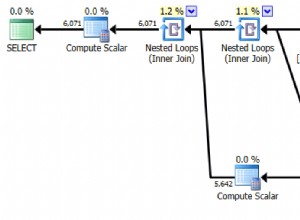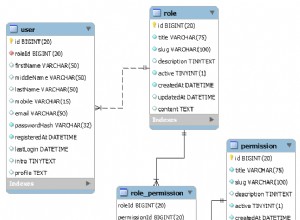उदाहरण के लिए अपने innodb तालिकाओं में वापस अनुक्रमित करने के लिए myisam फ़ुलटेक्स्ट तालिका का उपयोग करें:
innodb का उपयोग करके अपना सिस्टम बनाएं:
create table users (...) engine=innodb;
create table forums (...) engine=innodb;
create table threads
(
forum_id smallint unsigned not null,
thread_id int unsigned not null default 0,
user_id int unsigned not null,
subject varchar(255) not null, -- gonna want to search this... !!
created_date datetime not null,
next_reply_id int unsigned not null default 0,
view_count int unsigned not null default 0,
primary key (forum_id, thread_id) -- composite clustered PK index
)
engine=innodb;
अब फुलटेक्स्ट सर्च टेबल जिसका उपयोग हम अपने इनोडब टेबल में वापस इंडेक्स करने के लिए करेंगे। आप ट्रिगर या रात्रि बैच अपडेट आदि का उपयोग करके इस तालिका में पंक्तियों को बनाए रख सकते हैं।
create table threads_ft
(
forum_id smallint unsigned not null,
thread_id int unsigned not null default 0,
subject varchar(255) not null,
fulltext (subject), -- fulltext index on subject
primary key (forum_id, thread_id) -- composite non-clustered index
)
engine=myisam;
अंत में खोज संग्रहित प्रक्रिया जिसे आप अपने php/application से कहते हैं:
drop procedure if exists ft_search_threads;
delimiter #
create procedure ft_search_threads
(
in p_search varchar(255)
)
begin
select
t.*,
f.title as forum_title,
u.username,
match(tft.subject) against (p_search in boolean mode) as rank
from
threads_ft tft
inner join threads t on tft.forum_id = t.forum_id and tft.thread_id = t.thread_id
inner join forums f on t.forum_id = f.forum_id
inner join users u on t.user_id = u.user_id
where
match(tft.subject) against (p_search in boolean mode)
order by
rank desc
limit 100;
end;
call ft_search_threads('+innodb +clustered +index');
आशा है कि यह मदद करता है :)




